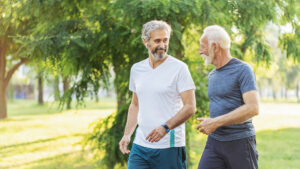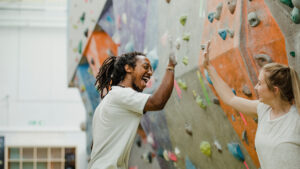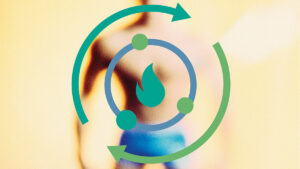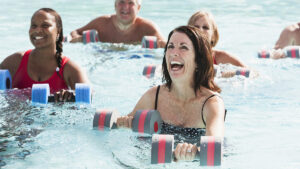Skills/Tools for Personal Trainers
1K Walk Test Can Predict Older Adult Fracture Risks
Fit pros working with older adults may using walking to screen for fracture risks and whether bone health should be prioritized.
Cardio and Strength Training Reduces Heart Disease Risks
Here’s more evidence to encourage clients to mix cardio and strength training in their program for health benefits.
Self-Compassion Aids Weight Loss Efforts
New research suggests that self-compassion increases a person’s self-control over exercise and eating behaviors.
Training During Ramadan
Gain practical insights into training during Ramadan and fostering cultural sensitivity to ensure your impactful training during this period.
Health Coaching: Behavior Change Strategies
We need to look at ourselves as change agents and implement the following behavior change strategies to help our clients.
Time-Restricted Eating and Resistance Training
Recent research on time-restricted eating and resistance training, plus several practical application tools to implement with your clientele.
Jaw Clenching and Upper Body Training
Jaw clenching without a mouthguard can work as a strategy to enhance isometric muscle contraction in the upper body, according to a study.
Guidelines for Exercise and Mental Health
Recommended guidelines for exercise and mental health, which facilitators like personal trainers or group exercise instructors can use.
2023 Fitness Industry Compensation Trends Report
This compensation trends report provides data on current wages in the industry as well as benefits and hiring and promotion criteria.
Increasing Walking Speed and Step Count for Longevity
This column explores why increasing client daily step count and walking speed is a worthwhile goal for all fitness professionals.
Healthy Diet Linked With Better Physical Fitness in Middle-Age
While fit pros urge clients to follow healthy sleep habits, they may also want to note that a healthy diet promotes better physical fitness.
Athletes and Irrational Beliefs
Many competitive athletes hold irrational beliefs and self-judgmental thoughts that lower self-confidence and increase competitive anxiety.
Pickleball: Preventing Injuries and Enhancing Performance
As pickleball continues to rise in popularity, it’s important that personal trainers understand the biomechanics of this dynamic sport.
Metabolism and Weight Management
Recent research points to effective new interventions when it comes to the relationship between metabolism and weight management.
Becoming a Holistic Wellness Industry
Success in fitness will require a more holistic wellness approach with knowledge of the emotional, social and mental perks of exercise.
Orienteering for Your Brain
If you offer orienteering sessions, you can promote the cognitive as well as physical advantages to boost brain training.
People With Disabilities in Fitness
If you think it feels great making the fit fitter, consider how rewarding it could be to share your knowledge of movement to empower and advocate to those who are…
Aquatic Exercise for People With Multiple Sclerosis
Survey results show that people with multiple sclerosis prefer aquatic exercise over nonaquatic exercise but have difficulty finding classes.
Machine-Based and Free-Weight Training for Functional Aging
Programming tips to help seniors age not just with grace but with strength through free-weight training and machine-based training.
Jump Roping for Runners
Attention avid runners who are game for something different: Consider adding jump roping to your weekly routine!



















